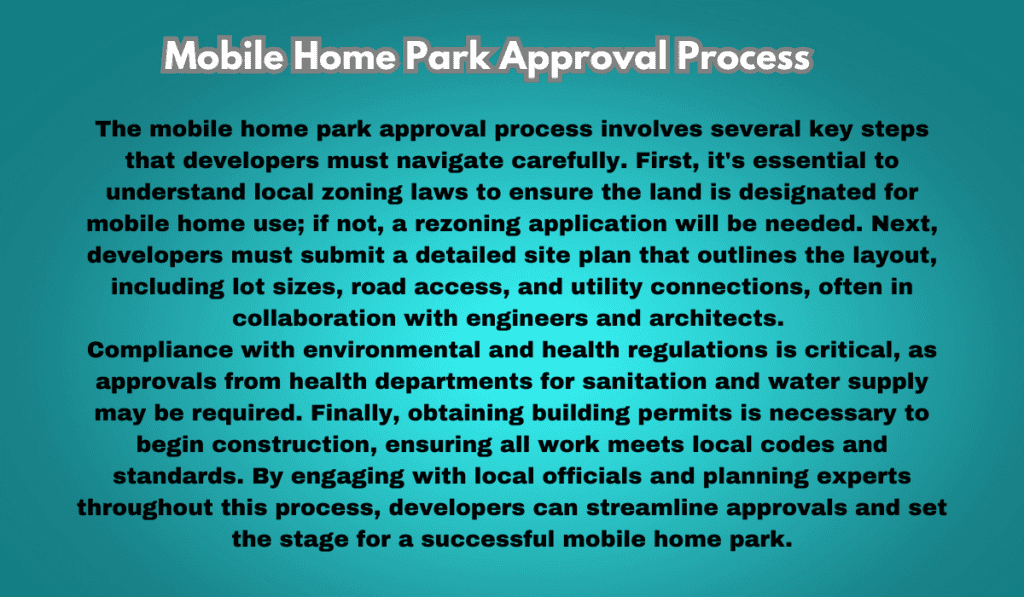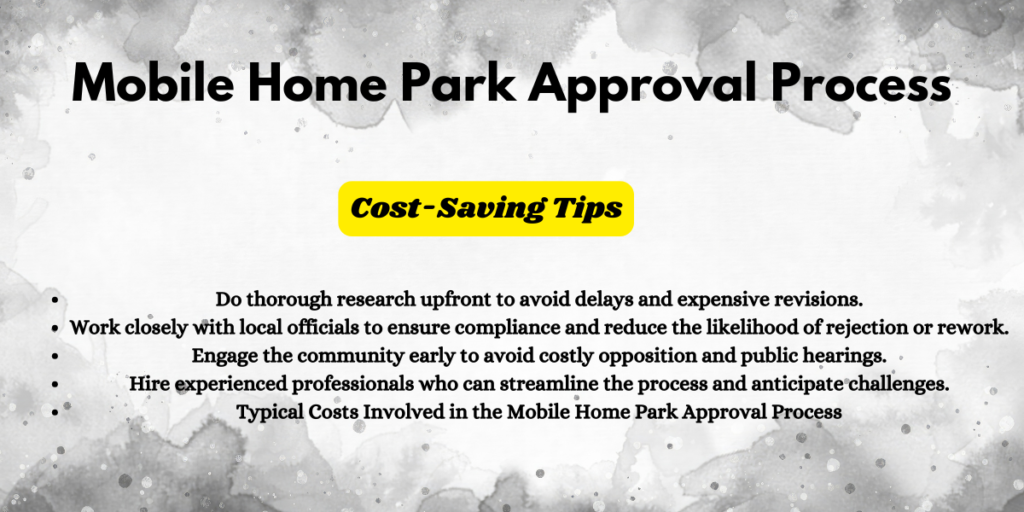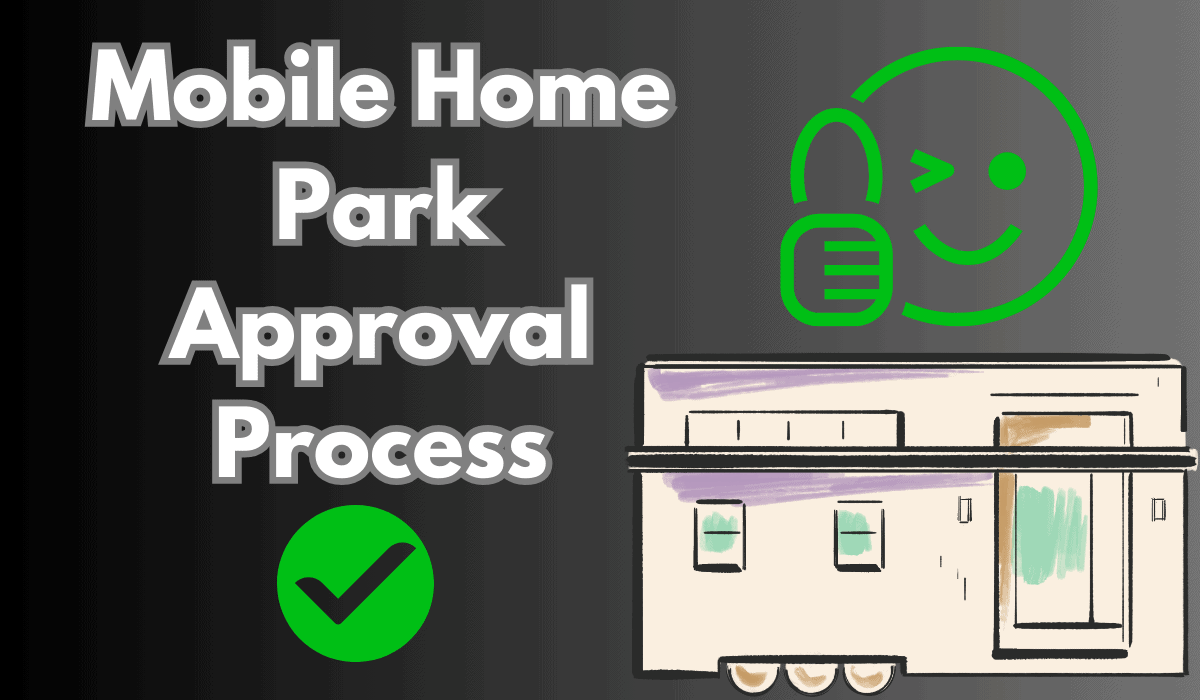Hello guys,
Mobile Home Park Approval Process: Developing a mobile home park is an attractive investment, offering a stable income stream and addressing the growing demand for affordable housing. However, turning this vision into reality requires navigating a complex approval process. From zoning regulations and environmental reviews to community engagement and infrastructure planning, the steps to secure approval for a mobile home park can be daunting.
Understanding each stage is crucial for avoiding costly delays and ensuring the success of your project. In this guide, we’ll break down the entire mobile home park approval process, helping you plan effectively and stay on track. Whether you’re a first-time developer or an experienced builder, this comprehensive overview will provide valuable insights to streamline your journey.
Mobile Home Park Approval Process
The mobile home park approval process involves several key steps that developers must navigate carefully. First, it’s essential to understand local zoning laws to ensure the land is designated for mobile home use; if not, a rezoning application will be needed. Next, developers must submit a detailed site plan that outlines the layout, including lot sizes, road access, and utility connections, often in collaboration with engineers and architects.
Compliance with environmental and health regulations is critical, as approvals from health departments for sanitation and water supply may be required. Finally, obtaining building permits is necessary to begin construction, ensuring all work meets local codes and standards. By engaging with local officials and planning experts throughout this process, developers can streamline approvals and set the stage for a successful mobile home park.
How Much Does It Cost To Have Mobile Home Removed

What is a Mobile Home Park?
A mobile home park is a residential community designed for mobile or manufactured homes, where individual lots are rented or leased to homeowners. These parks typically provide essential utilities and amenities like water, electricity, and sometimes recreational areas or community facilities. Mobile home parks offer affordable housing options for many families, retirees, and individuals, making them a popular choice in the housing market.
(Mobile Home Park Approval Process) As housing affordability continues to be a growing concern, mobile home parks have seen a resurgence in demand. They provide a more affordable living arrangement compared to traditional homes or apartments, while offering a sense of community and space that many other forms of affordable housing lack.
Importance of Understanding the Approval Process
Developing or expanding a mobile home park is not a straightforward task. The approval process involves navigating a complex web of zoning regulations, environmental requirements, community engagement, and permitting. Understanding this process is critical to ensuring that the development progresses smoothly and avoids unnecessary delays or legal complications.
Zoning Laws and Land Use
Zoning regulations are one of the most critical factors influencing the development of a mobile home park. Each city or county has specific zoning laws that designate where mobile home parks can be located. Before moving forward, it’s essential to thoroughly review local zoning maps and consult with the city planning office. If the land you’re considering is not already zoned for mobile home use, a rezoning application will be required, which can add significant time and complexity to the approval process. Understanding the local zoning and land use regulations from the start will help you avoid delays and costly changes.
Conducting a feasibility study is a crucial step to assess whether developing a mobile home park is a viable investment. This study should include an evaluation of the location, target demographic, infrastructure needs, and local market demand. You’ll need to analyze factors such as proximity to essential services, competition in the area, and potential resident income levels to ensure the park can attract long-term tenants. A solid feasibility study provides a data-driven foundation that will guide your decision-making and help secure financing.
Financing and Budgeting
Budgeting for a mobile home park involves estimating the cost of land acquisition, infrastructure installation (roads, water, sewer, and electricity), and securing all necessary permits. Additionally, you’ll need to account for ongoing maintenance and operational costs. Securing financing early in the process is key. Consider working with lenders who specialise in mobile home park developments, as they will be familiar with the unique challenges of this type of project. A well-structured financial plan ensures both the initial development and the long-term profitability of your mobile home park.
mobile home park approval process
Mobile Home Park Approval Process: The approval process for placing or moving a mobile home into a mobile home park can vary based on the park’s rules, local regulations, and state laws. However, there are some common steps that most parks and local authorities require. Here’s an overview of the typical mobile home park approval process:

Park Application
Most mobile home parks require potential residents to complete an application. This may include providing personal information, proof of income, and rental history. Some parks also require a credit check or background check as part of the approval process.
Tip: Be prepared with documents such as proof of employment, bank statements, and references.
Approval from the Mobile Home Park Management
Park Policies: Each park has its own rules and regulations regarding the type, size, and condition of mobile homes they allow. Management will review your application and decide whether your mobile home fits within their guidelines.
Considerations: Parks may have restrictions on home age, size, exterior condition, and features. Some parks only allow newer models or homes that meet certain aesthetic criteria.
Inspection and Home Condition
Home Inspection: Many parks require an inspection of the mobile home before it is moved onto the lot. This ensures that the home is structurally sound and meets safety standards. If you are purchasing a new home, this step might involve checking installation and setup standards.
Repairs: If the home is older or needs repairs, the park may require certain updates before approving its placement.
Compliance with Local and State Regulations
Permits: You may need permits from the local government to move or install a mobile home. This can include transportation permits and building permits (e.g., for utility hookups).
Zoning Laws: Verify that the park and the lot you plan to move into comply with local zoning ordinances. Some areas may have restrictions on mobile home placements, such as minimum lot size or setback requirements.
Codes: The home must comply with the local building codes and state HUD (Housing and Urban Development) regulations.
Utility Hookups and Site Preparation
Utilities: Make sure the park provides hookups for utilities such as water, electricity, sewage, and gas. In some cases, you may need to pay for or arrange these connections.
Foundation and Setup: Some parks require mobile homes to be placed on a permanent foundation or anchored according to specific standards. You may also need to arrange for skirting, landscaping, and other exterior improvements.
Lease Agreement and Fees
Lease: Once approved, you’ll need to sign a lease agreement with the park. This agreement typically outlines rent, maintenance responsibilities, and any park rules regarding behavior, pets, and home appearance.
Fees: Be aware of any upfront costs such as a security deposit, lot rent, or additional fees for utilities, park maintenance, or amenities.
Home Placement and Final Inspection
Home Delivery: After approval and securing necessary permits, your mobile home will be delivered and placed on the lot. Professional installation teams will handle the leveling, foundation, and utility hookups.
Final Inspection: A final inspection by park management or local authorities may be required to ensure the home is correctly installed and meets all safety and regulatory standards.
Ongoing Compliance
Park Rules: After moving in, you’ll be required to follow the park’s ongoing rules, which can include maintaining the home’s exterior, landscaping, noise restrictions, and more.
Regular Inspections: Some parks conduct periodic inspections to ensure homes and lots are being maintained according to park standards.
Final Thoughts
Mobile Home Park Approval Process: Navigating the mobile home park approval process can take some time, but with careful preparation and attention to detail, you can ensure a smooth transition into your new home. Be sure to thoroughly read all agreements and park rules to avoid any misunderstandings later on.
Mobile Home Park Approval Process Time and Costs

Mobile Home Park Approval Process
Approval Time: The entire process can take anywhere from 6 months to 2 years, depending on the complexity of the project, the zoning challenges, and the speed of regulatory approval.
Costs: Approval costs can range from $50,000 to $500,000 or more, depending on land acquisition, legal fees, utility connections, and infrastructure development.
Common Challenges in the Mobile Home Park Approval Process
Zoning Restrictions
Many municipalities have strict zoning regulations, and mobile home parks may not be permitted in all areas. Rezoning applications can be time-consuming and face opposition from residents or local officials.
Community Opposition (NIMBYism)
Local communities may oppose mobile home parks due to concerns about property values, increased traffic, noise, or changes in neighborhood character. This can lead to delays or even rejection of the proposal.
Environmental and Health Regulations
Compliance with environmental regulations (such as drainage, waste disposal, and floodplain management) can be complex and costly. Failing to meet local, state, or federal environmental requirements can halt or delay the project.
Infrastructure and Utility Challenges
Providing adequate utilities like water, sewer, and electricity can be difficult, especially in rural or undeveloped areas. Upfront costs for infrastructure installation can be significant, and permits for utility connections may take time.
Financing Difficulties
Securing financing for mobile home park development can be challenging, as some lenders may view these projects as higher risk. Additionally, the cost of purchasing land, building infrastructure, and obtaining permits can be significant.
Lengthy Approval Process
The overall approval process, from rezoning to securing permits, can be lengthy. The time involved in public hearings, reviews by planning boards, and addressing conditions of approval can delay the project for months or even years.
Changing Regulations
Local laws, zoning codes, and environmental standards can change over time, complicating the approval process. Developers may need to stay up-to-date on evolving regulations, which can impact project timelines and costs.
Site Suitability Issues
Not all properties are suitable for mobile home parks. Land in floodplains, near wetlands, or with difficult topography can lead to challenges in building and obtaining necessary approvals.
Traffic and Roadway Concerns
Increased traffic flow from the mobile home park may require road improvements, such as widening streets or adding traffic signals. This can add to the overall cost and complexity of the project.
Appeals and Legal Challenges
If the application is denied, the developer may need to appeal the decision, which can be a lengthy and costly legal process. Additionally, legal challenges from residents or organisations can further delay approval.
Mobile Home Park Approval Process: These challenges often require careful planning, collaboration with local officials, and strategic problem-solving to overcome successfully.
How long does approval take?
The mobile home park approval process can take anywhere from several months to a few years, depending on several factors. Here’s a breakdown of the timeframes associated with each stage:
Preliminary Research and Feasibility Study: 1-3 Months
- Researching zoning laws, land use regulations, and conducting a feasibility study to assess the viability of the project.
- Consulting with professionals like engineers, architects, and legal advisors.
- Preparing initial site plans and financial projections.
Zoning and Land Use Approval: 3-12 Months (or more)
- Rezoning Application (if necessary): This can take anywhere from 3-6 months, or longer, depending on the complexity of the rezoning request and local opposition.
- Public Hearings: Public meetings and hearings are required for rezoning and land-use changes. Community opposition can delay this stage by several months.
- Planning Commission Review: It may take weeks or months to get on the planning commission’s agenda, and further delays can happen if revisions are requested.
Site Plan Approval: 6-18 Months
- Submission of detailed site plans, including layout, utility connections, drainage, and infrastructure designs.
- Multiple rounds of review by city planners, engineers, and other local departments can extend the process.
- Revisions may be required if plans don’t meet local regulations or environmental standards.
Environmental and Health Approvals: 3-9 Months
- Compliance with local, state, and federal environmental regulations (e.g., stormwater management, sewage, floodplain impact).
- Health department approvals for water supply, sanitation, and waste management.
- Any failure to meet environmental guidelines can delay the process significantly.
Public Hearings and Community Engagement: 1-6 Months
- Public hearings may be required at multiple stages, including for rezoning, site plan approval, or environmental concerns.
- If community opposition arises, additional meetings or negotiations may be required, which can prolong the process.
Final Approval: 1-3 Months
- Once the site plan is approved, the planning commission or city council must give final approval.
- Conditions of approval (such as traffic improvements, environmental mitigation, etc.) may extend the timeline.
- If the project is denied, appealing the decision can add several more months to the process.
Total Timeframe: 12-36+ Months
- Best Case: If everything goes smoothly, the process may take about 1 to 2 years from initial planning to final approval.
- Worst Case: If significant hurdles like rezoning, community opposition, or environmental concerns arise, it could take 2 to 3 years or more.
Delays often come from the need for multiple rounds of revisions, public opposition, or waiting for hearings or regulatory reviews. Developers should plan for flexibility and allocate time for potential setbacks.
How to avoid delays?
Mobile Home Park Approval Process: How to Avoid Delays in the Mobile Home Park Approval Process
Conduct Thorough Initial Research
Understand Local Zoning Laws: Before purchasing land, review local zoning regulations to ensure mobile home parks are allowed. If rezoning is necessary, know the process and potential obstacles ahead of time.
Feasibility Studies: Conduct a comprehensive feasibility study, including market demand, infrastructure costs, and environmental factors. This will help identify potential red flags early on and avoid surprises later.
Engage Local Authorities Early
Pre-Application Meetings: Meet with city planners, zoning officials, and other relevant authorities before submitting formal applications. They can provide guidance on the approval process, regulatory requirements, and potential challenges.
Seek Clarifications: Clarify any ambiguous regulations or technical details to avoid submitting incomplete or non-compliant applications.
Hire Experienced Professionals
Consult Professionals: Work with experienced engineers, architects, environmental consultants, and legal experts who specialize in mobile home parks or land development. They can help ensure that site plans, infrastructure, and environmental assessments meet local standards.
Use a Project Manager: A skilled project manager can coordinate between all parties (contractors, regulators, community members) and keep the project on track.
Prepare High-Quality Application Materials
Detailed and Accurate Plans: Submit clear, detailed, and well-prepared site plans, environmental impact reports, and other documentation. Avoid mistakes, missing information, or incomplete submissions, which could lead to delays in approval.
Address All Requirements: Double-check that all local, state, and federal regulatory requirements are covered in the initial submission.
Engage the Community Early
Community Outreach: Before public hearings, engage the local community to address concerns and gain support. Address fears about property values, traffic, or environmental impact early to prevent community opposition from delaying the process.
Hold Information Sessions: Host community meetings or information sessions to explain the project’s benefits, address concerns, and demonstrate how it will meet local needs.
Plan for Environmental and Utility Approvals
Conduct Environmental Assessments Early: Ensure environmental studies (like stormwater, drainage, or soil assessments) are done early to avoid delays caused by environmental regulatory reviews.
Secure Utility Connections Early: Plan for and begin securing utility hookups (water, sewer, electricity) early in the process. Delays often arise when utility connections are left until later stages.
Be Proactive in Addressing Feedback
Respond Quickly to Requests: When regulatory bodies request revisions or additional information, respond promptly and thoroughly. Address all concerns in detail to avoid multiple rounds of feedback and revision.
Make Revisions Early: If local authorities recommend changes during the review process, make the necessary revisions quickly to keep the approval process moving.
Avoid Costly Appeals
Negotiate Compromises: If there are objections from the planning commission, local officials, or community members, be open to negotiating compromises to avoid a formal rejection or appeal process.
Understand Conditions of Approval: Often, approval may come with conditions (e.g., additional infrastructure, noise reduction measures). Address these conditions proactively to avoid further delays.
Monitor Legal and Regulatory Changes
Stay Updated on Local Regulations: Land use laws, zoning regulations, and environmental requirements can change over time. Stay informed to avoid sudden changes that could derail your project.
Anticipate Upcoming Changes: If local planning boards are discussing potential regulatory changes, consider adjusting your timeline or submission strategy to avoid being affected.
Maintain Clear Communication
Keep Open Lines with Officials: Regularly check in with local authorities and regulators to monitor the progress of your application. This can help you catch potential issues early.
Track Project Progress: Have a detailed project plan with timelines, and make sure everyone involved (architects, contractors, lawyers) is aligned to keep things moving efficiently.
What are approval costs?
Mobile Home Park Approval Process: Typical Costs Involved in the Mobile Home Park Approval Process
The approval process for a mobile home park can involve a variety of costs, which vary depending on the location, size of the project, and specific regulatory requirements. Here’s a breakdown of common costs:
Land Acquisition and Zoning Fees
Land Purchase Costs: Depending on the location, land prices can vary greatly. Rural areas may offer cheaper land, while urban or suburban areas can be expensive.
Rezoning Application Fees: If the land is not zoned for mobile home parks, a rezoning application is required. Fees can range from $500 to $5,000 or more, depending on the jurisdiction and the complexity of the request.
Zoning Attorney Fees: It may be necessary to hire an attorney specialising in land use or zoning. These fees can range from $200 to $500 per hour, with total costs from $5,000 to $20,000 depending on the complexity of the case.
Environmental and Health Permits
Environmental Impact Assessments: Depending on the local regulations, an environmental impact assessment (EIA) or environmental site review may be required. These studies can cost anywhere from $3,000 to $10,000, depending on the scope of the project and site-specific conditions (e.g., wetlands, floodplains).
Stormwater Management Plan: Most mobile home parks need a stormwater management plan to control runoff. Engineering costs for such plans can range from $2,000 to $15,000.
Soil and Drainage Studies: If soil testing or drainage studies are required to ensure land suitability, costs can range from $2,000 to $7,000.
Sanitation and Water Approvals: Health department approvals for water supply and waste management can cost between $500 and $5,000, depending on the type of system required (e.g., septic or public sewer).
Site Planning and Engineering Costs
Site Plan Development: Detailed site plans are often required, including the layout of roads, lots, utility hookups, and common areas. Hiring an engineer or architect to develop these plans can cost between $10,000 and $50,000, depending on the complexity and size of the park.
Utility Infrastructure Planning: Planning for utility connections (water, sewer, electricity) often requires specialized engineers, adding $5,000 to $20,000 to your budget.
Road and Access Engineering: Road design and traffic studies may be needed, especially if the development will increase traffic. These costs can range from $3,000 to $20,000, depending on the level of detail required.
Public Hearing and Community Engagement Costs
Public Hearing Fees: Many local governments charge fees for holding public hearings as part of the approval process. These can cost anywhere from $200 to $2,000 per hearing.
Consulting/PR Fees: If significant community opposition is anticipated, hiring public relations or community engagement consultants to help manage public opinion can cost $5,000 to $15,000.
Permit and Inspection Fees
Building Permits: Local governments require building permits for infrastructure (roads, utilities, etc.). Permit fees can vary widely, ranging from $1,000 to $10,000 or more, depending on the size of the park and the jurisdiction.
Utility Connection Fees: Fees for connecting to municipal utilities (water, sewer, electricity) can add between $1,000 and $50,000, depending on how far the property is from existing utility lines.
Environmental Permit Fees: In addition to the studies and assessments, you may need to pay environmental permit fees, which can range from $500 to $5,000 or more, depending on local regulations.
Inspection Fees: Multiple inspections will be required throughout the development process. Fees typically range from $500 to $5,000 depending on the size of the project and local requirements.
Legal and Professional Fees
Land Use Attorney: If legal issues arise during the approval process, a land use attorney may be necessary. Legal fees can range from $200 to $500 per hour, and total costs may run from $10,000 to $30,000 or more, depending on the complexity of the project.
Project Management Consultant: Some developers hire a consultant to oversee the entire approval process. Consultant fees may range from $100 to $300 per hour, or a flat fee of $10,000 to $50,000 for large projects.
Impact Fees and Infrastructure Contributions
Impact Fees: Some municipalities charge impact fees to offset the cost of additional infrastructure (e.g., schools, roads) resulting from the new development. These fees can range from $2,000 to $15,000 per unit, depending on local policies.
Infrastructure Contributions: Developers may be required to contribute to the cost of road widening, traffic signals, or other infrastructure improvements. Costs can range from $10,000 to $100,000 or more, depending on the size of the park and the required improvements.
Miscellaneous Costs
Appeal Fees: If your project is denied and you decide to appeal, there may be additional legal costs and application fees. This could range from $2,000 to $20,000 or more.
Miscellaneous Administrative Fees: Application processing fees, planning department review fees, and other administrative costs can add up, ranging from $1,000 to $5,000.
Total Estimated Costs
Mobile Home Park Approval Process: The total cost for the approval process for a mobile home park can range from $50,000 to $500,000 or more, depending on:
- The size of the park.
- The complexity of the regulatory environment.
- The level of opposition and the need for public outreach.
- Legal challenges or appeals.

Cost-Saving Tips
- Do thorough research upfront to avoid delays and expensive revisions.
- Work closely with local officials to ensure compliance and reduce the likelihood of rejection or rework.
- Engage the community early to avoid costly opposition and public hearings.
- Hire experienced professionals who can streamline the process and anticipate challenges.
- Typical Costs Involved in the Mobile Home Park Approval Process
The approval process for a mobile home park can involve a variety of costs, which vary depending on the location, size of the project, and specific regulatory requirements. Here’s a breakdown of common costs:
Conclusion
Mobile Home Park Approval Process: Developing a mobile home park is a rewarding but complex endeavor that involves several critical steps. From understanding zoning laws and land use regulations to conducting feasibility studies and securing financing, the early stages lay the groundwork for success. The application and permitting process is central, including securing zoning approvals, submitting site plans, and adhering to environmental and health regulations.
Equally important is infrastructure and utility planning, ensuring proper connections for water, sewer, and electricity, as well as compliant roadways, landscaping, and drainage systems. Each stage of the approval process is designed to ensure that your park is safe, sustainable, and suitable for future residents.
The mobile home park approval process requires patience, persistence, and careful attention to detail. Delays and challenges are common, but by staying proactive, engaging with local officials early, and working closely with planning experts, you can navigate the process more smoothly.
Keep an open line of communication with regulatory agencies, and don’t hesitate to seek advice from professionals in engineering, law, and community planning. (Mobile Home Park Approval Process) By being well-prepared and following the necessary steps, you’ll not only streamline the process but also ensure a successful and profitable mobile home park development in the long term.
Additional Resources
Relevant Local, State, and Federal Regulations
HUD Code for Manufactured Homes: [HUD Manufactured Housing Regulations](https://www.hud.gov/program_offices/housing/rmra/mhs/mhshome)
State Zoning and Land Use Laws: Check your state’s website for specific zoning laws.
EPA Stormwater Management Guidelines: [EPA Stormwater Regulations](https://www.epa.gov/npdes/npdes-stormwater-program)
National Flood Insurance Program (NFIP) Floodplain Management: [FEMA Floodplain Management](https://www.fema.gov/floodplain-management)
Contact Information
- Local Zoning Boards: Find contact information through your city or county planning department website.
- Environmental Agencies: Your state’s Department of Environmental Protection or local environmental quality agency can provide guidance on compliance.
- Planning Professionals: Consult your regional chapter of the American Planning Association for certified planning experts.
- Utility Providers: Contact your local water, sewer, and electrical utility companies to coordinate infrastructure planning.
Mobile Home Park Approval Process: These resources can help guide you through the approval process and connect you with the right professionals and agencies to ensure a smooth and compliant development project.
FAQ
Who owns the most mobile home parks?
The ownership of mobile home parks in the U.S. is diverse, with a mix of large corporate entities, private investors, and smaller operators. Some of the largest owners of mobile home parks include:
1.Equity LifeStyle Properties (ELS): A real estate investment trust (REIT) that is one of the largest owners of manufactured home communities in the U.S. They own and operate numerous parks across various states.
2. Sun Communities: Another prominent REIT, Sun Communities owns and operates a significant portfolio of manufactured home communities and RV resorts throughout the country.
3. Brookfield Asset Management: This global investment firm has also invested in mobile home parks, including acquisitions of existing communities.
4. Private Equity Firms: Various private equity firms have been increasingly interested in mobile home parks due to their potential for steady cash flow and the growing demand for affordable housing.
5. Regional Operators: Besides large corporations, many smaller, regional operators own multiple parks, focusing on specific markets or states.
Overall, while large companies and REITs dominate the landscape, there is a wide range of ownership types in the mobile home park industry.
Who is the largest mobile home builder?
The largest mobile home builder in the United States is Clayton Homes, a subsidiary of Berkshire Hathaway. Clayton Homes has been a significant player in the manufactured housing industry for decades, producing a wide range of mobile and modular homes. They offer various models and customization options, catering to different market segments and price points.
Other notable manufacturers include Fleetwood Homes, Cavco Industries, and Champion Home Builders, which also produce a substantial number of homes and have a strong presence in the market. These companies, alongside Clayton Homes, contribute significantly to the manufactured housing sector.

